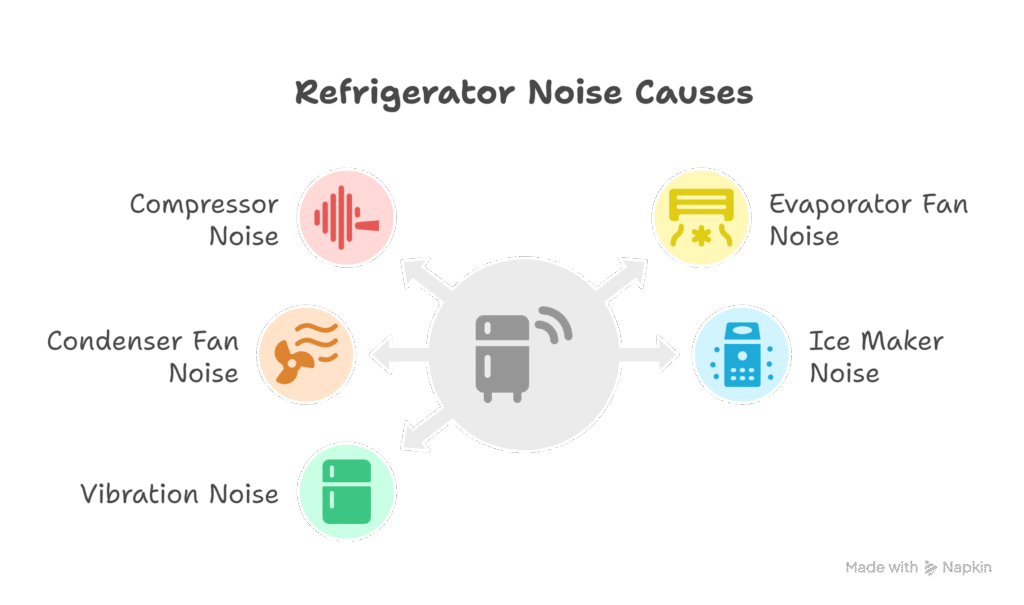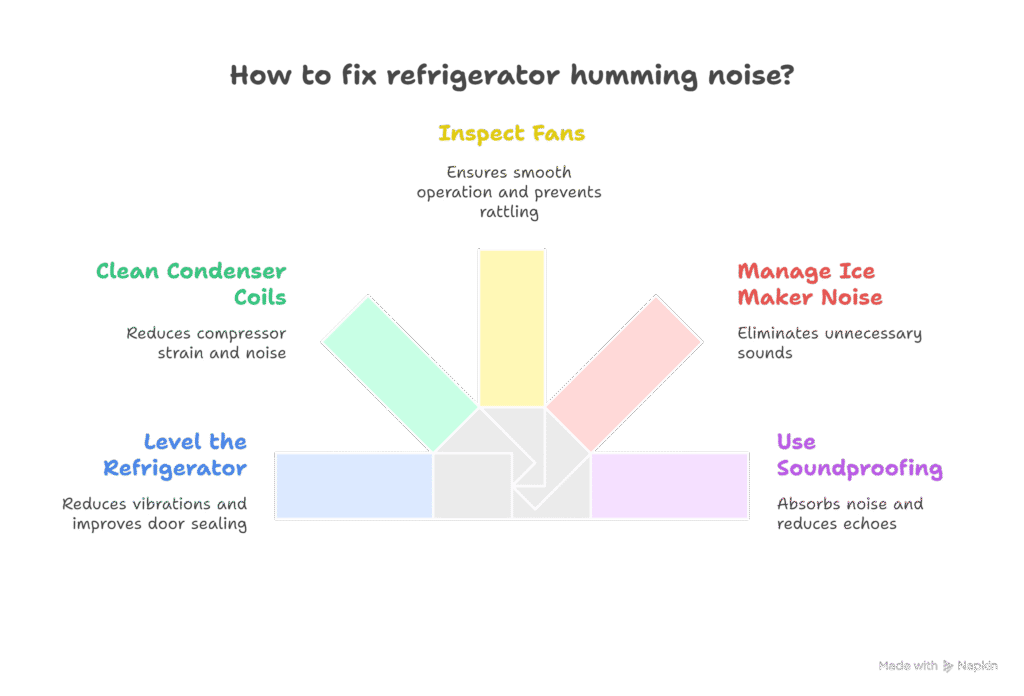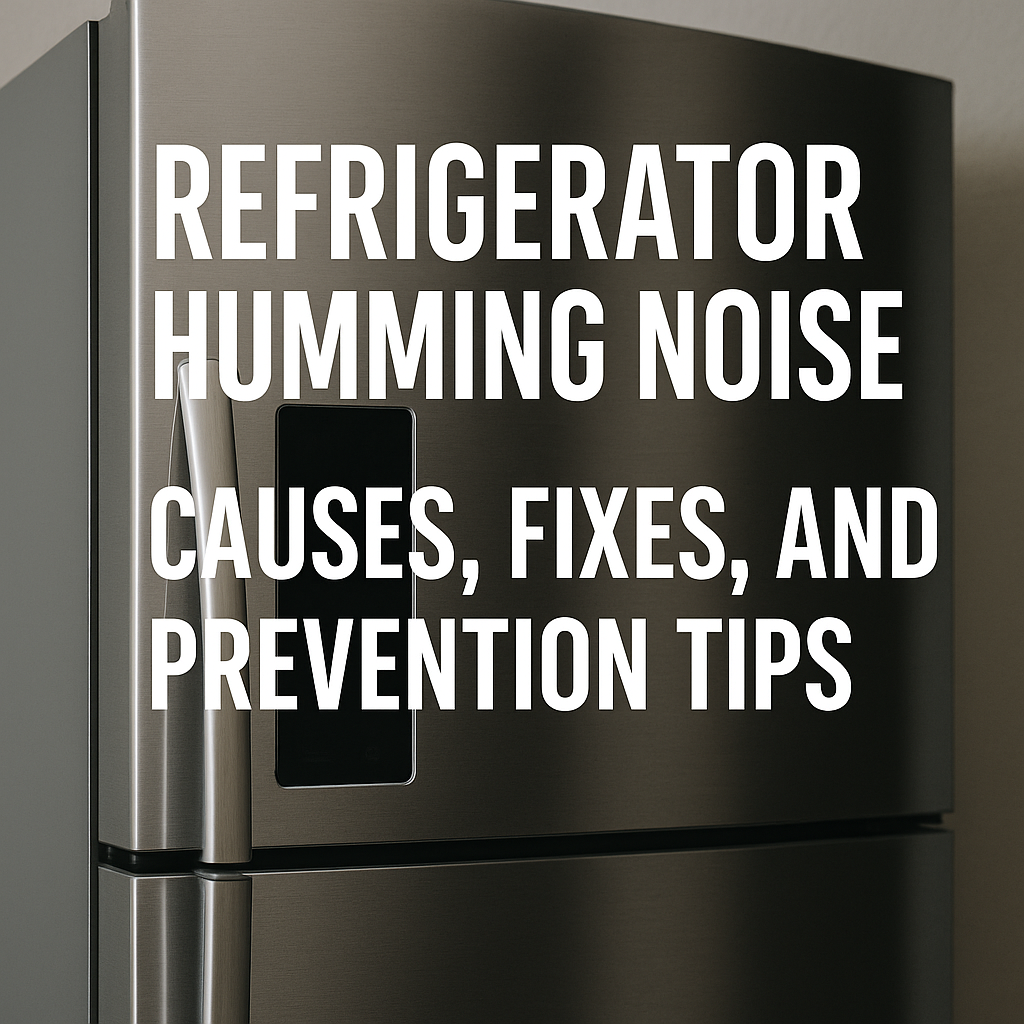Refrigerators are an essential part of our daily lives, ensuring that our food stays fresh and safe to eat. Normally, they operate with a faint hum that is barely noticeable. But when that hum turns into a loud refrigerator humming noise, it can quickly become annoying and disruptive. Understanding why your fridge is making noise and how to address it will not only restore peace to your kitchen but also keep your appliance running efficiently.
Although some level of sound is expected, unusual or persistent noises may point to underlying problems. Ignoring them could lead to costly repairs or reduced cooling performance. Let’s explore the most common reasons behind a refrigerator humming sound and practical solutions to fix it.
Common Causes of Refrigerator Humming Noise
1. Compressor
The compressor is the core component of your fridge, circulating refrigerant to regulate temperature. A gentle hum is normal, but if the compressor noise gets louder, it may be straining or reaching the end of its life. A technician should inspect it if the sound becomes excessive.
2. Evaporator Fan
The evaporator fan, located inside the refrigerator, circulates cool air across the coils. If it becomes blocked by ice or debris, it produces a loud whirring or buzzing fridge noise. Cleaning the fan blades or replacing the part usually resolves the issue.
3. Condenser Fan
At the back of the fridge, the condenser fan cools the compressor and coils. Dust buildup here often leads to a noisy refrigerator and higher energy consumption. Regular cleaning ensures quiet and efficient operation.
4. Ice Maker
For fridges with built-in ice makers, some noise during water filling and ice dumping is normal. However, if you hear repeated clunking or grinding, the ice maker may need repair or adjustment.
5. Vibrations
An unevenly positioned fridge often causes extra vibrations, resulting in a refrigerator humming sound. If your appliance touches a wall or cabinet, the noise can echo and seem louder than it really is.

How to Fix Refrigerator Humming Noise
Once you know the cause, applying the right fix can significantly reduce refrigerator sounds.
1. Level the Refrigerator
A tilted fridge vibrates more. Use a spirit level and adjust the feet to make sure your appliance sits evenly. This not only reduces noise but also improves door sealing.
2. Clean the Condenser Coils
Unplug your fridge before cleaning. Use a brush or vacuum to remove dust from the condenser coils found at the back or bottom. Clean coils reduce strain on the compressor and lower noise levels.
3. Inspect the Fans
Remove panels to access the fans. Clear any ice or debris, then spin the blades manually to check for smooth movement. If the fan feels stiff or rattles, replacement may be necessary.
4. Manage Ice Maker Noise
Check water connections to ensure they’re secure and leak-free. If you rarely use ice, consider turning the ice maker off to eliminate unnecessary humming or clunking sounds.
5. Use Soundproofing Solutions
Anti-vibration mats beneath your fridge can absorb excess noise. Acoustic wall panels also help reduce echoes, making the overall sound less noticeable.

Proactive Maintenance to Prevent Refrigerator Buzzing Noise
- Schedule Regular Inspections: Annual professional checkups help detect problems early.
- Stay Alert for Unusual Sounds: Clicking, popping, or grinding should not be ignored.
- Clean Frequently: Dust and dirt buildup increases both energy usage and refrigerator noise.
When to Call a Professional
Despite your best DIY efforts, some refrigerator humming noises require expert help:
- Loud buzzing or humming persists after troubleshooting.
- Unusual sounds like clicking, grinding, or knocking occur.
- The fridge struggles to maintain the right temperature or uses more energy.
A technician can diagnose and repair these issues, saving you from food spoilage and higher electricity bills.
FAQs About Refrigerator Humming Noise
1. Why is my refrigerator making a loud humming noise?
A loud hum usually comes from the compressor, condenser fan, or evaporator fan working harder than usual. Dust, ice buildup, or mechanical failure may be the cause.
2. Is a buzzing fridge dangerous?
Not always, but persistent or unusually loud buzzing can signal a failing compressor or electrical issue. It’s best to have it inspected if the noise continues.
3. How do I stop my fridge from humming loudly?
Level your refrigerator, clean the condenser coils, and check the fans. If the noise doesn’t stop, consult a professional technician.
4. Should a new fridge make humming sounds?
Yes, a soft humming is normal in new refrigerators as the compressor cycles on and off. Loud or irregular noises, however, may require attention.
5. When should I call a repair technician for refrigerator noise?
If your fridge is still making a loud humming sound after cleaning and leveling, or if you hear grinding, popping, or clicking noises, professional repair is needed.
Conclusion
A refrigerator humming noise can be frustrating, but most of the time it’s a fixable issue. From leveling your fridge to cleaning coils and inspecting fans, small steps go a long way in maintaining a quiet and efficient appliance. If the noise continues, professional help will ensure your refrigerator keeps your food fresh without disturbing your peace.





